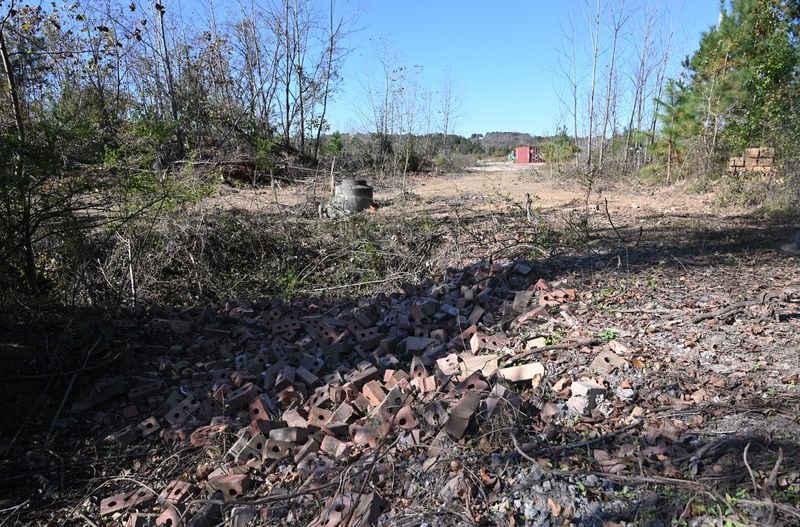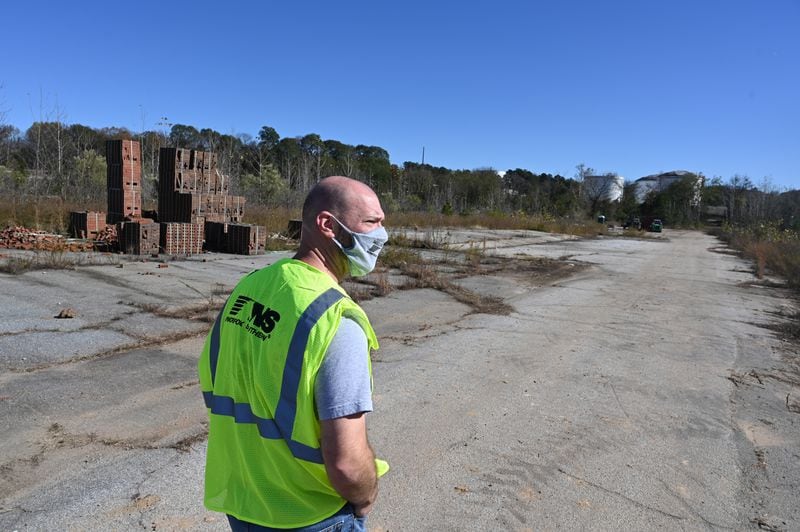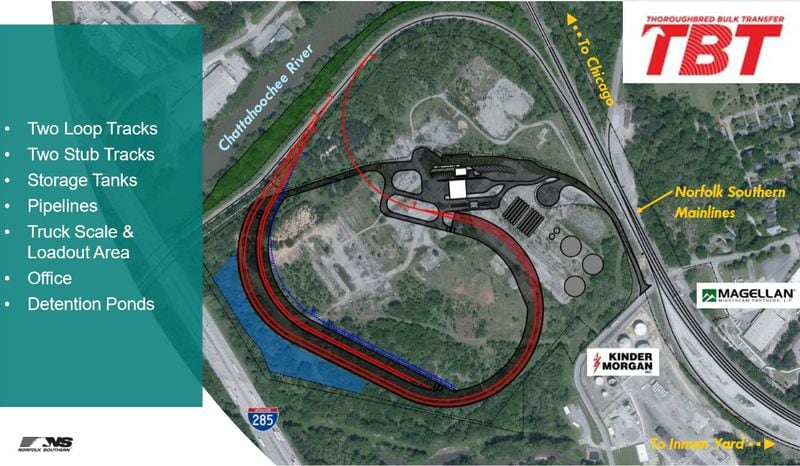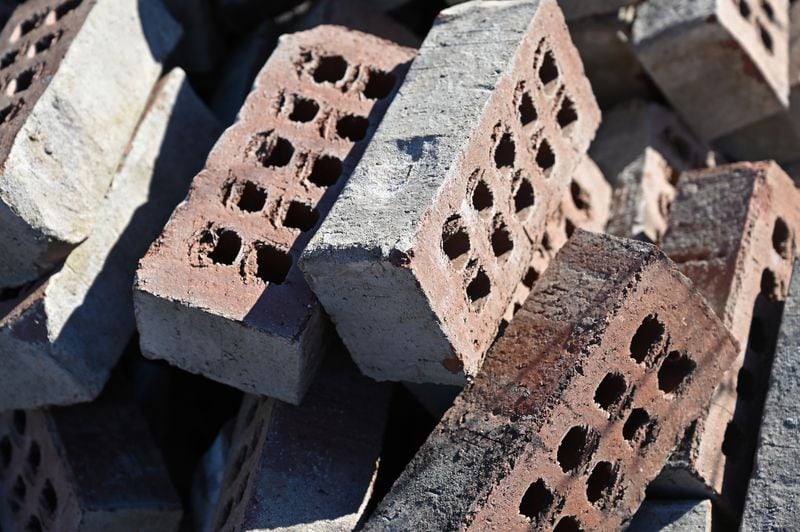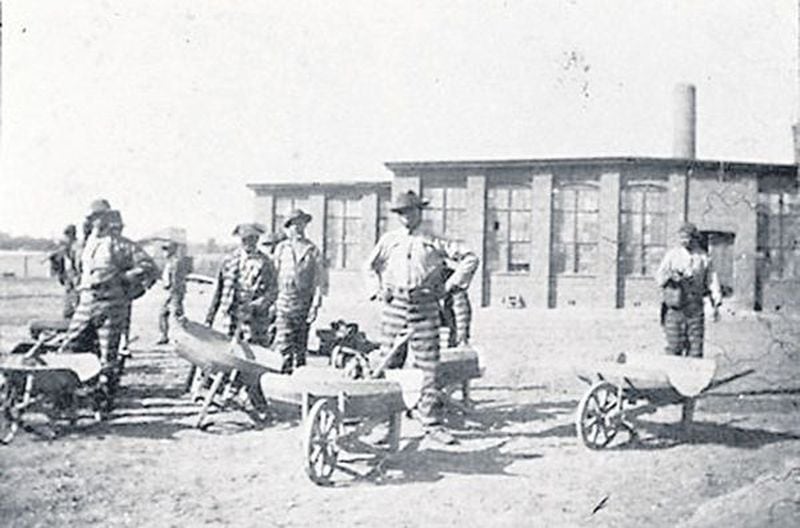Robert Kent has lived in northwest Atlanta for 20 years, but it wasn’t until a few years ago that he learned the true history of the land located just across the railroad tracks next to his neighborhood.
Today, the site is home to a mix of trees and brush, pavement and the occasional pile of bricks. But over 100 years ago, the Chattahoochee Brick Company operated the land just off Bolton Road and inside I-285. Through a state-run convict leasing program, inmates from Georgia’s prisons were leased to private companies like the brick plant, which used them for backbreaking labor, often with complete disregard for their health.
Historians have documented the abuse at Chattahoochee Brick was so extreme that some laborers — the overwhelming majority of whom were Black — died on the factory grounds.
Credit: HYOSUB SHIN / AJC
Credit: HYOSUB SHIN / AJC
“I’m just astounded by the whole thing,” said Kent, who lives in the Whittier Mill Village neighborhood, which borders the Chattahoochee River. “It’s truly disturbing to me.”
Norfolk Southern, which is also building its corporate headquarters in Atlanta, is in the process of securing state permits for a rail transfer terminal on the site of the old brick company. Because Norfolk Southern is a railroad, under the Interstate Commerce Commission Termination Act, it does not need to receive a land-use permit from the city to build.
Now, for the second time, Kent and other homeowners are fighting to have the site preserved. Atlanta City Hall is joining in the effort.
‘A tremendous blow’
In 2016, after running into the objections of nearby homeowners, South Carolina-based biofuel shipping company Lincoln Energy Solutions withdrew a permit application it had submitted to build a fuel terminal on the former brick company site. Residents cited the land’s history and environmental concerns about its proximity to the river and neighborhoods. They considered the plan withdrawal a win.
But now, those same residents said they feel blindsided after Lincoln leased the land to Norfolk Southern to move ahead with plans for the terminal.
“It was something that I don’t think any of us could foresee,” Donna Stephens, who lives in the nearby English Park neighborhood, said of Norfolk’s plans. “It was a tremendous blow.”
Norfolk Southern said it plans to install a memorial on the site to recognize the history and atrocities that happened there, and will comply with local and state regulations to ensure the development is safe. Norfolk will also work with the state’s Brownfield program to clean up the land.
Credit: HYOSUB SHIN / AJC
Credit: HYOSUB SHIN / AJC
“We take the concerns of the neighborhood seriously,” Norfolk Southern spokesman Jeff DeGraff said. “We want to ... ask them to trust us, ask them to have faith in us.”
Norfolk has already received ground disturbance and air permits from the state’s Environmental Protection Division, and is in the process of getting some federal permits that are needed to start construction, DeGraff said.
Some city leaders in Atlanta are now getting involved. Councilman Dustin Hillis, who represents the area, sent a pointed letter to Norfolk Southern and Lincoln last month urging the companies to back out of the proposal, which he called a “completely undesirable development on a unique and sacred site.” In the letter, co-signed by every member of the City Council, Hillis wrote that it feels like Norfolk Southern is using its legal protections to bypass the city’s permitting procedures.
Atlanta Mayor Keisha Lance Bottoms said last week she is aware of the concerns and the history of the land, but did not want to say more because she said there was the potential for litigation.
“I am closely monitoring it, and I’m very much aware of the historical significance of this site,” Bottoms said during a press briefing with local media.
Norfolk plans to use the transfer station to move materials like ethanol, oil or other commodities from train cars into trucks, pipelines or storage tanks, DeGraff said. The company operates 35 similar sites across its network, though this would be the first one in metro Atlanta.
Credit: Courtesy/Norfolk Southern
Credit: Courtesy/Norfolk Southern
Lincoln has also touted the project on its website and said the facility is “located on the Norfolk Southern” rail line and will “offer rail services for light oil products, butane, biodiesel and ethanol.” Lincoln did not return a request for comment for this article.
Stephens said she was encouraged four years ago after it became clear the city might deny Lincoln a permit and the company backed out of its plan. Now, she and others in the area feel left out of the discussion — neighbors said they learned about the new development plans only after a man walking his dog nearby spotted surveyors a few months ago.
“I didn’t realize how powerful railroad companies are,” Stephens said. “Some people think I’m kind of crazy, but I can’t build a deck on my house without a permit from the city but the railroad can build an entire (transfer) center?”
DeGraff said Norfolk Southern still plans to follow the guidelines the city would require if it were approving the plan. He added that the industrial proposal would be the best use of the land. While other parts of northwest Atlanta have recently seen old industrial sites converted into residential or commercial uses, this area off Bolton Road still has a heavy industrial presence, with massive fuel storage tanks located just across the street from the old Chattahoochee Brick site.
Credit: HYOSUB SHIN / AJC
Credit: HYOSUB SHIN / AJC
“This is a project that has a lot of business value for Norfolk Southern, and something that we’re very excited to have the opportunity to operate,” DeGraff said, adding that the firm is beginning to have community meetings to talk with neighbors about their plans.
An ‘ugly’ history
Normally, Councilman Hillis said, community opposition to a project like this might stem from worries over truck traffic, noise and safety surrounding a fuel facility. But with this project, neighbors’ concerns are “further exacerbated by the history and the ecological importance of the site,” he wrote to Norfolk Southern.
From the 1870s to the 1970s, the land was used by the Chattahoochee Brick Company, founded by former Atlanta Mayor James English. Until the early 1900s, the company participated in the state’s convict leasing program, which forced inmates from state prisons to work at the plant.
Credit: Courtesy Professor Richard Beche
Credit: Courtesy Professor Richard Beche
Douglas Blackmon’s 2008 Pulitzer Prize-winning book “Slavery By Another Name” documented atrocities that occurred at Chattahoochee Brick and other businesses that used convicts as workers. Blackmon reported that by 1897, decades after slavery was technically abolished, English was leasing over 40% of Georgia’s 2,900 convict laborers. They produced millions of bricks that built Atlanta’s sidewalks and neighborhoods.
The laborers at Chattahoochee Brick were subject to inhumane conditions including being beaten and fed rancid food, and some died there, Blackmon reported.
The brick company General Shale took over the plant from Chattahoochee Brick until the early 2000s, and it has sat vacant since then. Hillis said he would like to see the entire land preserved as a park and educational memorial about the convict leasing system in Georgia; he would be supportive of the city buying the land from Lincoln.
DeGraff said Norfolk Southern will work with the Atlanta History Center and local residents to plan a memorial, though it is too early to say what that might look like.
“This is an unfortunate and ugly part of history,” he said. “We want to make sure the history is recognized.”
Stephens and other residents are worried there could be unmarked graves found on the site, belonging to convict laborers who died there. The rail company said it has done an archeological survey and found no evidence of human remains. But as construction begins in the next few months, DeGraff said, there are protocols in place for crews to stop if they uncover any remains.
“I want more than a marker. I want more than a bench,” Stephens said. “I want a place where people can go and be educated, pay their respects. ... So many people don’t understand that that happened.”
